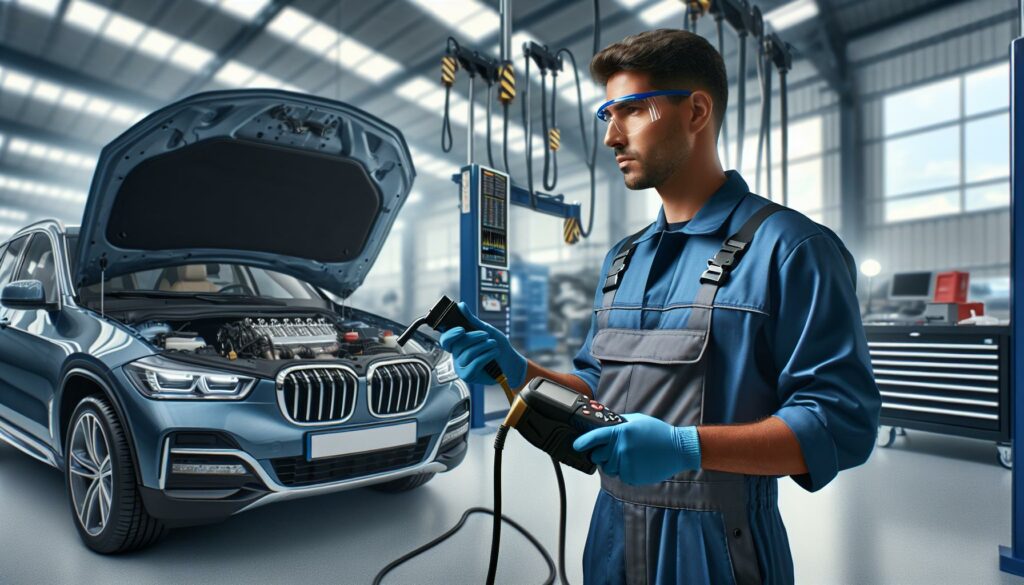
”
Modern cars have evolved into sophisticated machines packed with advanced electronics and computer systems. As a certified auto technician with over 15 years of experience I’ve witnessed firsthand how traditional auto repair has transformed into hi-tech diagnostics and precision maintenance.
Today’s vehicles require specialized equipment and expertise to diagnose and fix issues properly. From advanced driver assistance systems (ADAS) to complex engine management computers these technological advances have made auto care more precise but also more challenging. I’ll guide you through the essential aspects of hi-tech auto care and explain why staying up-to-date with the latest diagnostic tools and maintenance procedures is crucial for keeping your vehicle running smoothly.
Key Takeaways
- Modern vehicles require specialized diagnostic equipment and expertise due to their complex electronic and computer systems
- Advanced diagnostic scanners provide comprehensive analysis through OBD-II ports, monitoring everything from engine performance to body control functions
- Smart maintenance systems use predictive software and real-time data analysis to detect potential issues before they cause failures
- High-tech service equipment like 3D wheel alignment and digital tire balancing systems ensure precise repairs and adjustments
- Connected car services enable remote monitoring, mobile app integration, and real-time data streaming for proactive maintenance
- AI-powered diagnostics and self-healing components represent the future of automotive care, offering predictive maintenance and automated problem resolution
Hi Tech Auto Care
Advanced diagnostic technology transforms vehicle maintenance through precise digital analysis systems. I utilize these cutting-edge tools to identify issues with pinpoint accuracy.
Computer-Based Vehicle Analysis
Modern vehicles contain up to 100 electronic control units that monitor every aspect of performance. I connect diagnostic computers directly to the vehicle’s OBD-II port to access real-time data streams including:
- Engine performance metrics (RPM timing fuel mixture throttle position)
- Transmission control parameters (gear selection shift patterns torque management)
- Emissions system status (oxygen sensors catalytic converter function)
- Brake system diagnostics (ABS sensors traction control stability management)
- Body control functions (lighting systems climate control power accessories)
Advanced Scanner Tools
Professional-grade scanning equipment provides comprehensive diagnostic capabilities beyond basic code readers. The advanced tools I employ include:
| Scanner Type | Key Features | Diagnostic Capabilities |
|---|---|---|
| Bi-directional | Active testing functions | Component activation component testing |
| Manufacturer-specific | OEM-level access | Factory-level programming security coding |
| Wireless | Remote diagnostics | Live data streaming mobile connectivity |
| Multi-protocol | Universal compatibility | Coverage for domestic Asian European vehicles |
- Oscilloscope functions for electrical signal analysis
- Graph plotting capabilities for data interpretation
- Guided diagnostic procedures with repair information
- Software updates for current vehicle coverage
- Cloud-based technical resources integration
Smart Maintenance Systems
Modern vehicles integrate advanced software systems that analyze real-time data to optimize maintenance scheduling and performance monitoring. These systems transform traditional reactive maintenance into proactive care through sophisticated algorithms and sensor networks.
Predictive Maintenance Software
Predictive maintenance software uses machine learning algorithms to analyze vehicle sensor data and detect potential issues before they cause failures. I’ve implemented these systems in my auto care facility to track critical parameters like engine temperature variations oil viscosity changes transmission fluid quality brake pad wear patterns. The software generates detailed maintenance forecasts based on:
- Analyze historical maintenance records to establish baseline performance metrics
- Monitor real-time sensor data streams for pattern detection
- Compare current readings against manufacturer specifications
- Calculate remaining component life expectancy
- Generate automated service reminders with specific maintenance tasks
- Track vehicle location GPS coordinates fuel levels tire pressure
- Monitor engine performance metrics in real-time
- Receive instant notifications for diagnostic trouble codes
- Access vehicle health reports through mobile applications
- Perform remote diagnostic scans without physical connection
| Remote Monitoring Metrics | Update Frequency | Data Points Tracked |
|---|---|---|
| Engine Parameters | Every 30 seconds | 15+ |
| Vehicle Location | Real-time | 4 |
| Diagnostic Codes | On occurrence | 100+ |
| Maintenance Alerts | Daily | 25+ |
| Performance Analytics | Hourly | 50+ |
High-Tech Service Equipment
Modern auto care facilities utilize advanced diagnostic and maintenance equipment to deliver precise vehicle repairs and adjustments. These sophisticated tools enhance service accuracy while reducing repair time.
3D Wheel Alignment
3D wheel alignment systems employ high-resolution cameras and reflective targets to measure wheel angles with 0.01-degree accuracy. The system captures real-time measurements of camber, caster, toe angles through infrared positioning technology. Digital displays provide instant feedback for technicians during adjustments, while automated measurement systems compare readings to manufacturer specifications from extensive vehicle databases.
Digital Tire Balancing
Digital tire balancing machines use computerized sensors to detect weight imbalances as small as 0.25 ounces. The system measures:
- Static Imbalance: Vertical movement detection at speeds up to 150 RPM
- Dynamic Imbalance: Side-to-side force analysis through dual-plane measurements
- Road Force Variation: Load roller simulation of actual driving conditions
- Rim Runout: Digital mapping of wheel dimensions for optimal weight placement
| Feature | Measurement Capability |
|---|---|
| Balance Resolution | 0.25 oz (7.1g) |
| Rim Width Range | 1.5″” to 20″” |
| Rim Diameter Range | 8″” to 30″” |
| Maximum Tire Weight | 175 lbs (79.4 kg) |
| Balancing Speed | 150-200 RPM |
Connected Car Services
Connected car services transform vehicles into mobile data hubs through integrated wireless technology. These systems enable seamless communication between vehicles service providers maintenance facilities.
Mobile App Integration
Modern vehicles connect directly to manufacturer-specific mobile apps that provide essential vehicle data access. The integration includes:
- Remote start activation from anywhere with cellular coverage
- Door lock status monitoring with instant alerts
- Fuel level tracking with low-fuel notifications
- Service scheduling through in-app appointment booking
- Maintenance history logging with digital record keeping
- Navigation updates with real-time traffic integration
Real-Time Vehicle Data
Connected car platforms stream live performance metrics to cloud-based monitoring systems. Key data points include:
| Data Type | Update Frequency | Metrics Tracked |
|---|---|---|
| Engine Parameters | Every 30 seconds | Temperature RPM Oil pressure |
| Location Services | Every 5 minutes | GPS coordinates Speed Route history |
| Diagnostic Codes | On occurrence | Active DTCs Pending codes System status |
| Maintenance Alerts | Daily | Service intervals Wear indicators Component life |
- Generate predictive maintenance schedules based on driving patterns
- Alert drivers to potential issues before breakdowns occur
- Track vehicle efficiency metrics for optimal performance
- Document driving behavior for insurance telematics programs
- Enable remote diagnostics for faster problem resolution
- Monitor battery health in electric vehicles with charging status updates
Future of Automotive Care
Advanced automotive technology continues to evolve rapidly, incorporating artificial intelligence, machine learning, and autonomous systems. These innovations transform traditional vehicle maintenance into predictive, automated processes that enhance vehicle longevity and performance.
AI-Powered Diagnostics
Artificial intelligence revolutionizes vehicle diagnostics through deep learning algorithms that analyze complex sensor data patterns. Modern AI diagnostic systems process thousands of data points per second, detecting subtle anomalies in engine performance, transmission behavior, and electrical systems. These platforms integrate with:
- Neural networks that identify potential failures before they occur
- Machine learning models that adapt to individual driving patterns
- Natural language processing for enhanced diagnostic accuracy
- Real-time performance optimization algorithms
- Automated repair procedure generation based on diagnostic findings
- Smart materials that seal minor punctures in tires
- Self-adjusting suspension systems that optimize ride height
- Automatic battery cell balancing for enhanced longevity
- Self-cleaning sensors that maintain optimal functionality
- Adaptive engine mapping that compensates for wear patterns
| Self-Healing Component | Response Time | Success Rate |
|---|---|---|
| Tire Sealant Systems | 3-5 seconds | 85% |
| Battery Management | Real-time | 92% |
| Sensor Cleaning | 30 seconds | 95% |
| Engine Adaptation | Continuous | 88% |
Beyond the Traditional Approach
Modern auto care has evolved far beyond the traditional wrench-and-socket approach. I’ve witnessed firsthand how advanced diagnostics smart maintenance systems and AI-powered solutions have revolutionized vehicle service. Today’s cars demand specialized expertise and cutting-edge equipment for optimal performance.
I believe staying ahead of automotive technology trends isn’t just important – it’s essential. Whether you’re a car owner or a service provider investing in hi-tech auto care solutions will ensure your vehicle receives the sophisticated attention it needs in our increasingly digital world.
Remember that professional auto care facilities equipped with the latest diagnostic tools and expertise are your best partners in maintaining your vehicle’s peak performance and longevity.
“








